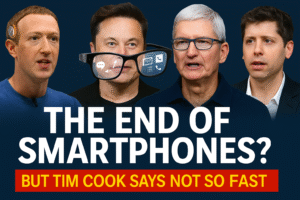The End of Smartphones? Tech Leaders Think So

Some of the biggest names in tech — Elon Musk, Mark Zuckerberg, Sam Altman, and Bill Gates — are all pushing the envelope by inventing new devices that could replace smartphones. They’re all thinking about the future in bold ways. Brain chips, digital tattoos, and glasses that show you information in real time. This technology sounds like science fiction, but it’s becoming a reality.
However, one big voice isn’t on board with this new venture: Apple CEO Tim Cook. He still believes in the power of the smartphones.
Let’s take a closer look at what each of these tech leaders is working on, and why Tim Cook is taking a different path.
Brain Chips and Tattoos: Musk and Gates’ Bold Vision
Elon Musk and Neuralink

Tesla and SpaceX founder Elon Musk also runs a company called Neuralink. Neuralink is making brain-computer implants. These chips are implanted in the brain and allow people to control devices with just their thoughts.

Neuralink has already tested the technology on two human patients. The goal of the technology? No need for a phone, a screen, or even voice commands. Your thoughts do all the work. Want to text someone? Just think. Need to browse the web? Think about it.
Bill Gates and Digital Tattoos

Bill Gates is backing a company called Chaotic Moon. The company is making electronic tattoos— thin, skin-like devices that are worn directly on the body. These tattoos contain tiny sensors to track a person’s health, location, and more.

Think of this technology as your body becoming a smartphones. there’s no screen in your hand, but your skin becomes the interface. These tattoos could let you do everything a phone can do — and more.
Augmented Reality Glasses: Zuckerberg’s Big Bet
Meta and Vision-Based Tech

Mark Zuckerberg, CEO of Meta (Facebook’s parent company), believes that AR glasses are the future. Mark Zuckerberg predicts that by 2030, most people will be wearing smart glasses instead of using smartphones.

These glasses will display information in front of your eyes when worn over your eyes. Imagine walking down the street and seeing messages, maps, or video calls appear on the lenses without having to take out your phone.

Zuckerberg’s dream is to beyond screens and connect people in the metaverse. A virtual world where you can work, play, and talk to others in real time.
Sam Altman’s AI-First Hardware Plans
From ChatGPT to Real-World Devices

OpenAI (the company behind ChatGPT) CEO Sam Altman is also getting into hardware. The technology aims to create AI-powered devices that interact with people naturally without using a screen.

Altman wants to create a world where you can talk to AI assistants like friends and use technology without needing a phone. Altman’s goal is simple: make AI feel like a part of your life, not just another app.

Altman recently teamed up with former Apple design chief Jony Ive to to develop a new kind of AI device — one that could even replace a smartphone.
Apple Says: Not So Fast
Tim Cook Stands By the iPhone

While everyone else is moving towards wild new technology, Apple is taking a different path. Tim Cook and Apple just released the iPhone 16, which includes powerful AI features but keeps the smartphones design classic.

Cook believes that people still love and depend on their phones. Tim Cook is not trying to replace phones. Instead, he is gradually adding new technologies like AR and AI while keeping the smartphone as the foundation.
Cook said that “we are focused on improving the things that people already use.” His message is clear—Apple wants to evolve the phone, not kill it.
A Battle of Idea: Replace vs Improve
This isn’t just a battle over gadgets. It’s a clash of ideas. One side wants to change the way we live, replacing screens with brainwaves and digital skin. The other side—led by Apple — wants to improve what we already use every day.
So, what does this mean for you?
If you’re excited about wild new tech, you might like what Musk, Gates, Altman, and Zuckerberg are up to.
If you prefer familiar tools that get smarter over time, Apple might be the company to watch.
What happens Next?
We don’t know for sure if smartphones are really going away. But one thing is clear: Big changes are coming. Whether it’s brain chips, glasses, tattoos, or smart AI devices, your next tech upgrade might not fit in your pocket at all.
Hey there!
Welcome to Moviezhive.com, where blockbuster entertainment is just a click away!
Stream a vast collection of Bollywood, Hollywood, and international movies for free—no subscriptions, no hassles.
What Makes Us Special?
✔️ Thousands of movies across all genres
✔️ Zero pop-up ads for seamless viewing
✔️ Advanced zero-buffering tech for smooth playback
✔️ Fresh titles added regularly
Can’t find a movie? Request it, and we’ll upload it fast!
Watch anytime, anywhere. Visit https://moviezhive.com now and start your movie adventure!
Enjoy the Show,
The Moviezhive Team